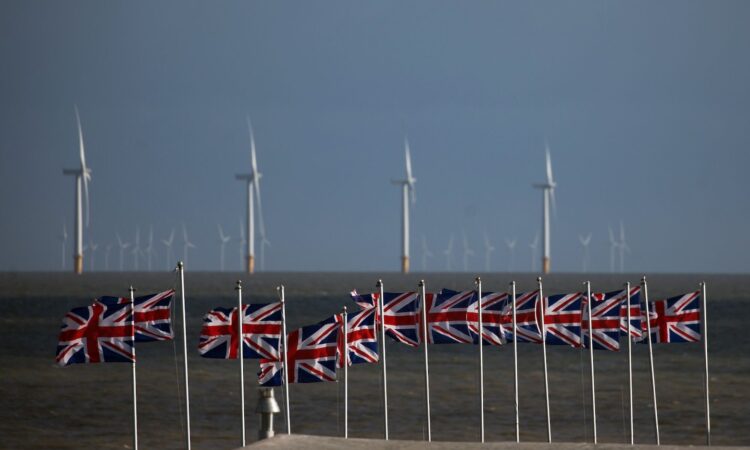
There are plenty of past successes to be proud of: The Climate Change Act, passed by parliament in 2008 by an overwhelming cross-party majority, was revolutionary — the first legally binding mitigation target set by a country. In 2019, the UK became the first major economy to enshrine a net-zero emissions commitment in law. At the 2021 United Nations Climate Summit in Glasgow, the UK laid out an ambitious intermediary target of reducing greenhouse gas emissions by at least 68% by 2030, to align with the Paris temperature goal of no more than 1.5C of warming.
Those commitments helped drive change: In 2022, we emitted 46% less than we did in 1990, thanks largely to eliminating coal from most of our electricity generation. In 2018, a 10-year review of the Climate Change Act by the Grantham Research Institute found that it had helped to reduce emissions, while the economy continued to grow.
Today, the picture is bleaker. In 2022, the High Court ruled that the government’s net-zero strategy was unlawful and inadequate. So in March, the government defogged the windows on its climate policy with thousands of pages of detail. But rather than reassuring everyone that our ambitions are on track, it’s had the opposite effect: In its latest progress report, the UK’s Climate Change Committee (CCC), an independent advisory body, says its confidence in the government meeting the 2030 target — now just seven years away – has dropped markedly:
The recent rate of emissions reduction outside the electricity supply sector must quadruple. Time is now very short to achieve this change of pace.
The report notes continued delays in policy development and implementation, as well as an overly narrow approach to solutions. The cause? A failure of leadership, the committee concludes.
Producing almost 3,000 pages of material on climate and energy strategies requires a huge underlying work program in the pipeline. But nothing on the agenda is a political priority. In a media briefing, Chris Stark, chief executive officer of the CCC, accused the government of taking a “wait and see” approach and being unwilling to tackle demand-side policies, such as shifting people to more sustainable diets and reducing air and car travel. That might allow it to avoid making tough decisions, but it’s a risky strategy that makes the job harder down the line.
The government is doing itself and the country a disservice by not tackling decarbonization with greater urgency. For starters, people really do care. Polling shows 82% of people are concerned about the climate crisis; 85% agreed with the statement “If everyone does their bit, we can reduce the effects of climate change.”
Joined-up thinking could allow several issues to be tackled at once. Stark uses energy pricing as an example: Electricity is currently more expensive than gas, due to green taxes that add about 12% to its cost. Rebalancing this would make low-carbon choices, such as switching to electric cooking and heat pumps, easier for people to make — and reduce their bills in the middle of a cost-of-living crisis.
The UK is looking increasingly un-credible on the world stage. A new coal mine is set to open in Cumbria, and approval is imminent for Rosebank, the UK’s largest untapped oil and gas field which, ironically, could be developed using wind-powered drilling rigs. Such moves go against the scientific consensus that any new oil and gas will blow through our carbon budget, as well as undermining the careful language that the UK negotiated during its COP26 Presidency in the Glasgow Climate Pact.
Meanwhile, the US, European Union and China have moved ahead with bold climate policies aimed at spurring green investment. UK Chancellor of the Exchequer Jeremy Hunt has promised a response in the Autumn budget. In the meantime, the UK risks falling behind as other major economies increase their market share in key products and services. “Urgency is the word we have to hold on to,” CCC Chairman Lord Deben said in a press briefing. “These chances won’t come again.”
The UK’s climate targets aren’t simply aspirations — they’re the law. We’re already getting a taste of what a warmer world will bring — dangerous heat waves, water shortages, food insecurity. June will be the hottest in the UK since records began almost 140 year ago, the Met Office said this week. Continuing on the current path will be perilous for both the government and the nation it serves.
More From Bloomberg Opinion:
• A Roasting Texas Denies Workers Shade and Water: Mark Gongloff
• To Beat the Heat, Our Homes Need to Be Batteries: David Fickling
• Water Risks Are Coming to Bite Investors: Lara Williams
This column does not necessarily reflect the opinion of the editorial board or Bloomberg LP and its owners.
Lara Williams is a Bloomberg Opinion columnist covering climate change.
More stories like this are available on bloomberg.com/opinion






